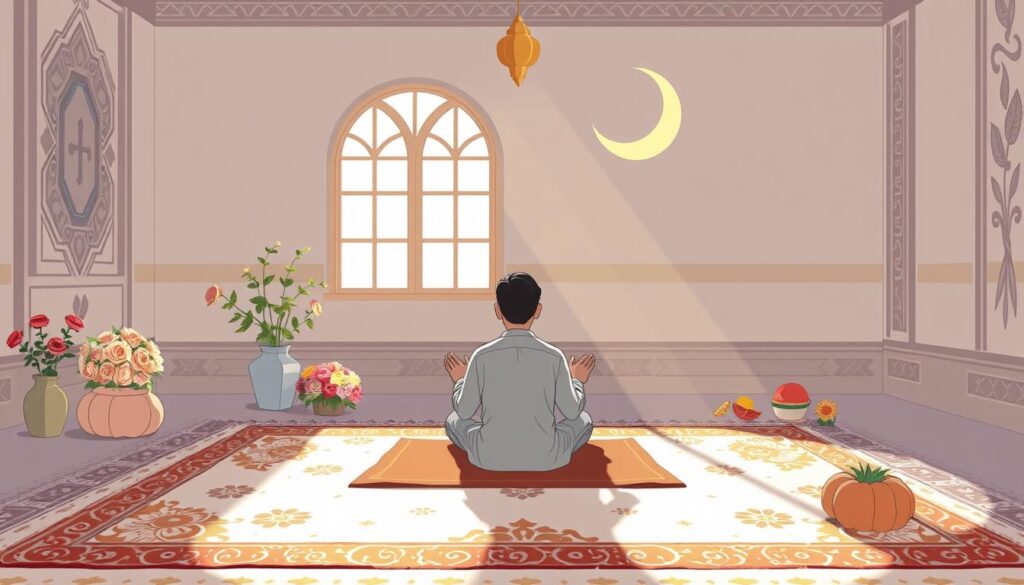Did you know that saying thanks can lead to more blessings from Allah, as Surah Ibrahim, 14:7 says? This idea that gratitude and blessings go hand in hand is key in Islam. At Umar Khan Charity Organization, we encourage you to learn about the importance of gratitude. We show how to thank Allah through prayer and action, using Muslim prayers and Islamic duas.
Exploring Duas for Gratitude, we see that saying these prayers often can make us more thankful. We’ll talk about how to make gratitude a part of our daily lives. This way, we can appreciate Allah’s blessings and mercy more. We’ll also see how gratitude can make us happier and more satisfied with life.
By being thankful, we can grow our faith and trust in Allah. This brings us peace and reassurance. Through Duas for Gratitude, we can thank Allah for things like food and shelter. We also recognize Allah’s power and control over everything.
Key Takeaways
- We can increase the likelihood of receiving further blessings from Allah by expressing gratitude.
- Reciting Duas for Gratitude regularly can cultivate gratitude and bring positive changes into our lives.
- Incorporating Muslim prayers for thankfulness and Islamic duas of appreciation into our daily routine can foster a sense of appreciation for Allah’s blessings and mercy.
- Gratitude in Islam can lead to increased happiness and life satisfaction.
- Practicing gratitude can strengthen our faith and trust in Allah, contributing to a sense of reassurance and peace.
- Umar Khan Charity Organization invites you to join us in exploring the significance of gratitude and how to thank Allah for life’s blessings through prayer and action.
Understanding Duas and Their Significance
We think that saying thanks in Duas is a strong way to bond with Allah. It helps us feel thankful every day. The Prophet Muhammad (peace be upon him) showed us that being thankful brings more blessings and closeness to Allah.
At the Umar Khan Charity Organization, we stress the importance of community and working together. We encourage Muslims to join in thanking and worshiping together. By saying Thankful prayers in Islam every day, we grow closer to Allah and feel more positive.
Some key benefits of Grateful supplications in Islam include:
- Increased sense of spiritual awareness and connection to Allah
- Improved mental health and well-being
- Enhanced sense of community and belonging
By adding Expressing gratitude in Duas to our daily prayers, we get these benefits and more. It changes our lives and the lives of those around us for the better.
| Benefit | Description |
|---|---|
| Spiritual Awareness | Increased sense of connection to Allah and spiritual awareness |
| Mental Health | Improved mental health and well-being through regular prayer and gratitude |
| Community | Enhanced sense of community and belonging among Muslims |
The Power of Gratitude in Daily Life
Practicing gratitude can change our lives and those around us. It spreads positivity and kindness. Studies show it lowers stress and anxiety, making us happier and more well.
The Quran reminds us of Allah’s endless favors in verse 14:34. It shows us the many blessings we have. This verse encourages us to be thankful every day.
How Gratitude Impacts Mental Health
Gratitude boosts our mental health. It makes us more resilient, self-compassionate, and friendly. By saying Dua for showing gratitude daily, we feel these benefits. Starting with Islamic gratitude duas in the morning helps us stay thankful.
Fostering a Positive Mindset Through Thankfulness
To be positive, we should say Duas for expressing thanks often. We can do this in many ways, like:
- Gratitude meditation
- Thankful journaling
- Reciting Islamic prayers (duas)
Adding these to our daily life changes our outlook. It makes us happier and more well.

Key Duas for Expressing Gratitude
We believe showing gratitude is key to our faith. We can express thanks through various Muslim prayers. Islamic duas of appreciation are vital in our daily lives. They help us feel thankful for the blessings we get.
Here are some examples of duas for expressing gratitude:
- Dua for gratitude after meals
- Dua for gratitude after prayer
- Dua for gratitude during times of hardship
These duas help us appreciate and be thankful, even when things are tough. By making gratitude a part of our daily routine, we grow our faith. We also develop a positive outlook on life.
At the Umar Khan Charity Organization, we invite you to join us. We aim to spread gratitude and kindness in our community. Together, we can make a difference and build a more caring society.
| Dua | Purpose |
|---|---|
| Dua for gratitude after meals | To express gratitude for the food we eat |
| Dua for gratitude after prayer | To express gratitude for the opportunity to pray |
| Dua for gratitude during times of hardship | To express gratitude for the blessings we have, even in hard times |
Specific Situations to Offer Duas of Gratitude
We show thanks to Allah in many ways, like when we achieve something or stay healthy. This helps us appreciate Allah’s kindness more. The Prophet Muhammad (peace be upon him) said we should thank Allah always, in good times and bad.
Looking back, we find times when duas for gratitude mean a lot. For example, when we hit personal goals or get better health, we can say thankful prayers in Islam. Even when things are tough, grateful supplications in Islam can keep us hopeful and faithful.
Here are some times to say dua for showing gratitude:
- When we reach personal goals, like finishing a hard project or reaching a long-term goal
- When we’re thankful for our health, like getting better from an illness or feeling better physically or mentally
- During happy times, like weddings or birthdays
By saying thankful prayers in Islam and grateful supplications in Islam every day, we get closer to Allah. This makes us more positive and thankful. As we make dua for showing gratitude a habit, we’ll feel more at peace, happy, and spiritually grown.
| Situation | Dua for Gratitude |
|---|---|
| Personal Achievements | Alhamdulillah (All praise is for Allah) |
| Gratitude for Health and Well-being | Shukr (Gratitude) to Allah for His blessings |
How to Make Duas More Meaningful
We believe that making our duas more meaningful can deepen our connection with Allah. This can also make our prayers more effective. The Quran teaches us to pray with a pure heart and true intention.
Reflecting on our Islamic gratitude duas shows us the importance of intention. It’s key to be mindful of our thoughts and actions. This ensures our prayers are genuine and heartfelt.
Setting the Right Intention
To set the right intention, we need to understand our motivations. Are we expressing gratitude or asking for something specific? Clarifying our intentions helps us focus and make our prayers meaningful. Using Duas for expressing thanks keeps us positive and on track.
The Role of Sincerity in Prayer
Sincerity is vital in prayer, allowing us to connect deeply with Allah. Praying sincerely increases the chance of a positive response to our duas. To be sincere, we should reflect on ourselves, acknowledging our strengths and weaknesses. This makes our prayers more heartfelt and effective.
| Benefits of Sincere Prayer | Examples |
|---|---|
| Deepens connection with Allah | Increased sense of peace and tranquility |
| Increases effectiveness of prayers | Positive responses to duas, improved mental health |
| Cultivates a sincere heart | Increased self-awareness, improved relationships with others |
By following these tips and being sincere in our prayers, we can make our Muslim prayers for thankfulness more meaningful. The key is to pray with a sincere heart and a true desire to connect with Allah.
Using Duas for Family and Friends
We think sharing gratitude with our loved ones builds a supportive community. It fosters positivity and kindness. By saying thanks in Duas, we make our bonds stronger and feel more thankful.
Studies show that praying together boosts our gratitude and connects us to Allah. The Prophet Muhammad (peace be upon him) said our prayers are more likely to be accepted when we pray together. So, we invite our family and friends to join us in saying thanks, using phrases like “Alhamdulillah” and “SubhanAllah” to start our prayers.
Encouraging Loved Ones to Practice Gratitude
We can inspire our loved ones to be thankful by sharing our gratitude stories. We can also help them find ways to say thanks in Islam every day. This way, gratitude can spread through our community.

How Collective Prayer Enhances Thankfulness
Praying together makes us feel more connected and united. It deepens our gratitude by letting us share our good and bad times. Praying together also helps us learn from each other and see the value of saying thanks in Duas. Some benefits include:
- Increased sense of community and belonging
- Deeper sense of connection to Allah and our faith
- Improved mental and emotional well-being
By adding Duas for Gratitude to our daily prayers and sharing them with our family and friends, we build a culture of thankfulness. This benefits everyone involved.
Integrating Gratitude Duas into Worship
We think adding Islamic duas of appreciation to our daily prayers makes us more thankful. These duas, like the Dua for showing gratitude, help us stay positive and thankful. They remind us of Allah’s kindness and blessings.
In salah, we can say specific duas to thank Allah. For example, the Dua for guidance and protection. This keeps our focus on our intentions and connects us with Allah. Remembering Allah, or Dhikr, is also key. It reminds us of Allah’s presence and blessings in our lives.
Here are some ways to add gratitude duas to our worship:
- Reciting the Dua for showing gratitude after each salah
- Practicing Dhikr regularly, such as after meals or before bed
- Incorporating Islamic duas of appreciation into our daily conversations and thoughts
By making these practices a part of our daily routine, we can strengthen our faith. We become more grateful for Allah’s blessings. This helps us feel closer to our Creator and the world around us.
| Dua | Translation | Benefits |
|---|---|---|
| Dua for showing gratitude | Expressing thanks for Allah’s blessings | Increases sense of gratitude and positivity |
| Dua for guidance | Seeking Allah’s guidance and protection | Enhances spiritual growth and direction |
Connecting Gratitude with Other Aspects of Life
We think that linking gratitude to other life areas helps us value Allah’s gifts more. When we think about Duas for expressing thanks, we see how Muslim prayers for thankfulness are key in our daily routines.
Balancing Gratitude with Humility
To really value life’s blessings, we need to mix gratitude with humility. This means we should know where our blessings come from and understand our own limits. This way, we can grow a sense of Islamic gratitude duas that’s genuine and humble.
Observing Blessings in Everyday Moments
Seeing blessings in our daily lives is a great way to grow gratitude. We can start by taking a few minutes each day to think about the good things around us. This could be Duas for expressing thanks for our health, friends, and everyday needs.
- Noticing blessings in our lives keeps us positive and focused on what’s important
- Building gratitude in our daily lives can make us happier and more content
- Practicing Muslim prayers for thankfulness brings us closer to Allah and strengthens our faith

Overcoming Challenges to Maintain Gratitude
We all face challenges that make it hard to stay grateful. But, by saying Dua for showing gratitude every day, we can keep a positive outlook. This helps us stay thankful, even when things get tough.
Gratitude is key in Islam. The Quran tells us that only a few truly thank Allah. We can show our thanks through Hamd (words of thanks) and Shukr (actions of thanks).
Here are some ways to keep gratitude alive:
- Do sajdat shukr (prostration of thankfulness) to thank Allah for blessings or during hard times.
- Recite Thankful prayers in Islam to grow a sense of gratitude.
- Use Grateful supplications in Islam to ask for guidance and support.
By doing these things and adding Dua for showing gratitude to our daily lives, we get closer to Allah. We also learn to appreciate His blessings more.
Sharing Gratitude Duas with Community
Sharing Islamic duas of gratitude can spread kindness and positivity. This can change lives in our community. The Prophet Muhammad (peace be upon him) showed us the value of sharing knowledge and being thankful.
Teaching others about gratitude duas can help build a thankful community. We can share these during gatherings, sermons, or online. Encouraging loved ones to say these duas daily can make us all more thankful and closer to Allah.






